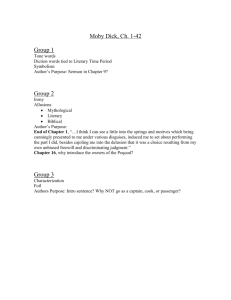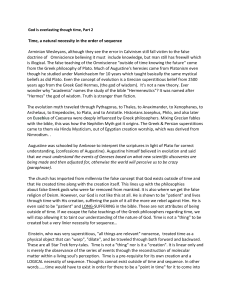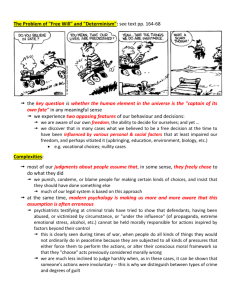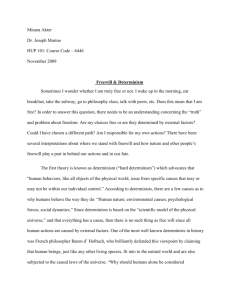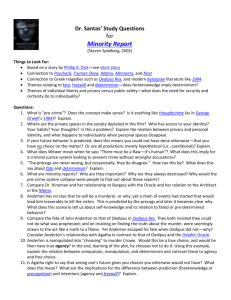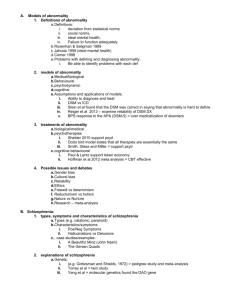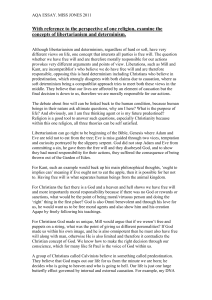Full Article
advertisement
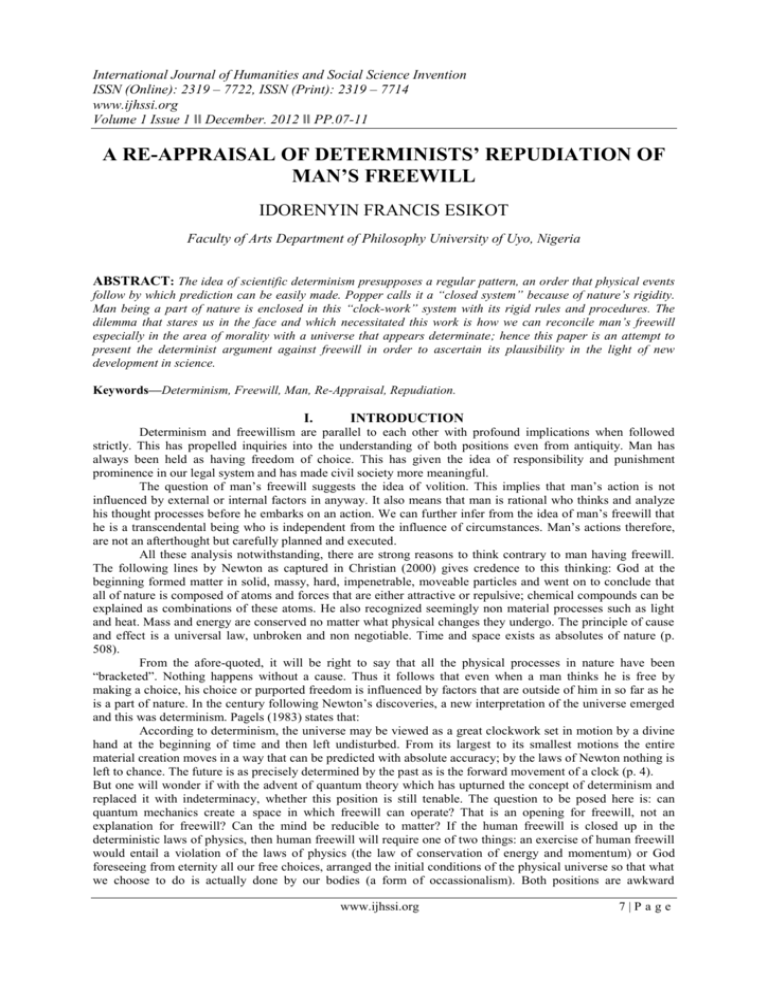
International Journal of Humanities and Social Science Invention ISSN (Online): 2319 – 7722, ISSN (Print): 2319 – 7714 www.ijhssi.org Volume 1 Issue 1 ‖‖ December. 2012 ‖‖ PP.07-11 A RE-APPRAISAL OF DETERMINISTS’ REPUDIATION OF MAN’S FREEWILL IDORENYIN FRANCIS ESIKOT Faculty of Arts Department of Philosophy University of Uyo, Nigeria ABSTRACT: The idea of scientific determinism presupposes a regular pattern, an order that physical events follow by which prediction can be easily made. Popper calls it a “closed system” because of nature’s rigidity. Man being a part of nature is enclosed in this “clock-work” system with its rigid rules and procedures. The dilemma that stares us in the face and which necessitated this work is how we can reconcile man’s freewill especially in the area of morality with a universe that appears determinate; hence this paper is an attempt to present the determinist argument against freewill in order to ascertain its plausibility in the light of new development in science. Keywords––Determinism, Freewill, Man, Re-Appraisal, Repudiation. I. INTRODUCTION Determinism and freewillism are parallel to each other with profound implications when followed strictly. This has propelled inquiries into the understanding of both positions even from antiquity. Man has always been held as having freedom of choice. This has given the idea of responsibility and punishment prominence in our legal system and has made civil society more meaningful. The question of man’s freewill suggests the idea of volition. This implies that man’s action is not influenced by external or internal factors in anyway. It also means that man is rational who thinks and analyze his thought processes before he embarks on an action. We can further infer from the idea of man’s freewill that he is a transcendental being who is independent from the influence of circumstances. Man’s actions therefore, are not an afterthought but carefully planned and executed. All these analysis notwithstanding, there are strong reasons to think contrary to man having freewill. The following lines by Newton as captured in Christian (2000) gives credence to this thinking: God at the beginning formed matter in solid, massy, hard, impenetrable, moveable particles and went on to conclude that all of nature is composed of atoms and forces that are either attractive or repulsive; chemical compounds can be explained as combinations of these atoms. He also recognized seemingly non material processes such as light and heat. Mass and energy are conserved no matter what physical changes they undergo. The principle of cause and effect is a universal law, unbroken and non negotiable. Time and space exists as absolutes of nature (p. 508). From the afore-quoted, it will be right to say that all the physical processes in nature have been “bracketed”. Nothing happens without a cause. Thus it follows that even when a man thinks he is free by making a choice, his choice or purported freedom is influenced by factors that are outside of him in so far as he is a part of nature. In the century following Newton’s discoveries, a new interpretation of the universe emerged and this was determinism. Pagels (1983) states that: According to determinism, the universe may be viewed as a great clockwork set in motion by a divine hand at the beginning of time and then left undisturbed. From its largest to its smallest motions the entire material creation moves in a way that can be predicted with absolute accuracy; by the laws of Newton nothing is left to chance. The future is as precisely determined by the past as is the forward movement of a clock (p. 4). But one will wonder if with the advent of quantum theory which has upturned the concept of determinism and replaced it with indeterminacy, whether this position is still tenable. The question to be posed here is: can quantum mechanics create a space in which freewill can operate? That is an opening for freewill, not an explanation for freewill? Can the mind be reducible to matter? If the human freewill is closed up in the deterministic laws of physics, then human freewill will require one of two things: an exercise of human freewill would entail a violation of the laws of physics (the law of conservation of energy and momentum) or God foreseeing from eternity all our free choices, arranged the initial conditions of the physical universe so that what we choose to do is actually done by our bodies (a form of occassionalism). Both positions are awkward www.ijhssi.org 7|P age A Re-Appraisal Of Determinists’ Repudiation Of Man’s Freewill philosophically. However, it creates room for serious probing into the issue of determinism and freewillism as they unearth serious challenges when isolatedly or collectively considered. Let us begin our excursus with the notion of determinism in science. II. DETERMINISM IN SCIENCE Scientific knowledge is regarded as proven or factual knowledge. Its empirical nature thrives by its method which incorporates observation, measurement, testing and experimentation through hypotheses and theory formulation into its inquiry. Science thrives by its reliance on knowledge of the physical world from where uniformity and regularity of laws are deduced. Determinism according to Blackburn (2005) is: The doctrine that every event has a cause. The usual explanation of this is that for every event, there is some antecedent state, related in such a way that it would break a law of nature for this antecedent state to exist yet the event not to happen (p. 97). From the forgoing, mental processes would seem to be nothing more than physical events in the brain. Consequently, the human decision-making process would be a sequence of physical events which is as determined as any other material process. Smart (1982) however argues that: The question of pure chance or determinism is irrelevant to the question of freewill; though, so far from free will and determinism being incompatible with one another, a close approximation to determinism on the macro-level is required for free will (p.342). The two dogmas that constitute the essence of materialism are the sole reality of matter and the reign of law. And these are the foundation of a deterministic world view. Common sense suggests to a person that law governs inanimate nature and one’s neighbours, while freedom is reserved for oneself. In this way both law and freedom are gratified to the full. Russell (1968) following this common sense notion avers that: All perennial controversies such as that between determinists and believers in free will, spring from a conflict between opposing passions, both widespread, but one stronger in one man and the other in another (p. 66). The rigid determinism implied by Newton’s laws promotes a sense of security about the place of humanity in the universe. All that happens therefore, the tragedy and joy of human life is already predetermined. The objective universe exists independently of human will and purpose. Nothing we do can alter it. The wheels of the great world clock turn as indifferent to human life as the silent motion of the stars; in a sense, eternity has already happened” (Pagels, 1982: p.5). As strange as it seems today, complete determinism was the only conclusion that could be reasonably drawn from classical Newtonian physics. Even the great scientific advances of the nineteenth century, the theory of heat (thermodynamics) and the theory of light (electromagnetic wave) were worked within the framework of deterministic physics. Even though quantum theory seem to have penetrated the structure of atom and have discovered the randomness and indeterminacy of matter, determinism still pervade in the macro world where objects are large and where matter does not move near the speed of light. But despite this, it has been argued that it is unintelligible to locate human freedom in the ability to reflect and reason, nevertheless such abilities are still consistent with determinism. Determinism is seen then as a doctrine that has morally undesirable consequences. It is a doctrine which is claimed to lead to personal inertia and prevents the full exercise of human powers. But the question still remains: is it the belief that we are responsible, and that others will hold us responsible that serves as a cause for new effort and new directions in our actions? Let us now examine the notion of freewill and responsibility for further insight. III. FREEWILL, CHOICE, RESPONSIBILITY AND PUNISHMENT Central to the idea of freewill is choice and responsibility. The will is understood by the materialist in a sense as a modification of the brain, by which it is disposed to action, or prepare to give play to the organs. Holbach (2005) insists that: this will is necessarily, determined by the qualities, good or bad, agreeable or painful, of the object or the motive that acts upon his senses, or of which the idea remains with him, and is resuscitated by his memory (p. 392). In consequence man acts necessarily, his action is the result of the impulse he receives either from the motive, from the object, or from the idea which has modified his brain, or disposed his will. When he does not act according to this impulse, it is because there comes some new cause, some new motive, some new idea, which modifies his brain in a different manner, given him new impulse, determining his will in another way, by which the action of the former impulse is suspended. Thus, the sight of an agreeable object, or its idea, determines his will to set him in action to procure it; but if a new object or a new idea more powerfully attracts him, it gives a new direction to his will, annihilates the effect of the former, and prevents the action by which it was to be procured. This is the purported mode in which reflection, experience, reason, necessarily arrests or suspends the actions of man’s will without this he would of necessity have followed the anterior impulse which carried him towards a then desirable object. In all this it appears man always acts according to necessary laws from which he has no means of emancipating himself. www.ijhssi.org 8|P age A Re-Appraisal Of Determinists’ Repudiation Of Man’s Freewill The metaphysical angle to the problem of human freewill might be summarized from the perspective that human beings are responsible agents. By this, their actions are not determined or caused despite the many choices they may have concerning a course of action. Roderick M. Chisholm gave an illustration on man’s deed and misdeed and Feinberg and Landau (2005) captures it thus: One man, say shot another. If the man was responsible for what he did, then I will urge, what was to happen at the time of shooting was something that was entirely up to the man himself. There was a moment at which it was true, both that he could have fired the shot and also that he could have refrained from firing it. And if this is so, then, even though he did fire it, he could have done something else instead (p. 419). But often times we could explain it away that the man didn’t find himself firing the shot against his will. Thus we can conclude that if a man is responsible for a certain event or a certain state of affairs as in the example of the shooting of another man, then that event or the state of affairs was brought about by some act of his, and the act was something that was in his power either to perform or not to perform. The idea of justice follows naturally from this question of man’s freewill to make choices and take responsibility. Thus retributivism is the application of the principle of desert (in simple term, getting what one deserves) to cases of punishment. Why punish someone at all for the crime they commit? Rachels (2002) proposes the following reasons: People who commit crime such as murder and rape deserve to be punished and that this alone is sufficient to justify punishing them. It is not merely that punishing them satisfies certain sorts of vengeful feelings. On the contrary, it is a violation of justice if murderers and rapists are allowed to walk as if they had done nothing wrong (p. 470). The above lines simply identify punishment with the choice we make which puts the weight of responsibility on our shoulders. Thus acknowledging deserts is part of a moral system that allows people, by their own behavior, to determine how others will respond to them. Those who willingly treat others well elicit good treatment in return while those who treat others badly provoke ill treatment in return. Punishments we can conclude therefore restore equilibrium. That is why it is commonly held that “crime upsets the scales of justice” and that punishing wrong doers restores the balance. It has also been argued in some quarters that punishment (retributivism) is not the solution to preventing crime. We are admonished to try and identify its causes and do something about them. This issue of cause takes us back to determinism. For it presupposes that there are factors that leads a man to taking a particular course of action sometimes, against his will. If this is the case, how can man be responsible for his acts, when in choosing between right or wrong, his will is determined. Let us attempt to analyse this core issue. IV. ARGUMENTS AGAINST MAN’S FREEWILL One commonly held belief is that if there is no freewill, there can be no morality. Morality is concerned with what men ought and ought not to do. Laying credence to this position the pro-freewillist will argue that if man has no freewill or freedom to choose what he will do, if whatever he does is determined or done under compulsion, then it does not make sense to tell him that he ought to have done something different. All moral precepts would in such case be meaningless. Also if he acts always under compulsion, how can he be held morally responsible for his actions? How can he, for example, be punished for what he could not help doing? It appears then that the argument in favour of freewill is contingent upon maintaining the substratum of the society so that it does not become a jungle for all; but it has not really touched on the nitty gritty as the determinists will want us to believe. In whatever manner man is considered, he is connected to the universal nature, and submit to the necessary and immutable laws that she imposes on all the beings she contains, according to their peculiar essences or to the respective properties with which, without consulting them, she endows each particular species. Holbach (2005) further maintains thus: man’s life is a line that nature commands him to describe upon the surface of the earth, without his ever being able to swerve from it even for an instant (p. 392). Man then, it will be safe to conclude is born without his own consent; his organization does in no wise depend upon himself; his ideas comes to him involuntarily; his habits are in the power of those who cause him to contact them; he is unceasingly modified by causes, whether visible or concealed, over which he has no control, which necessarily regulate his mode of existence and determine his way of thinking and manner of acting. Man then is good or bad, happy or miserable, wise or foolish, reasonable or irrational, sometimes without his willingness to be in any of these various states. Nevertheless, in spite of the shackles by which he is bound, there is the pretence that he is a free agent or that independent of the causes by which he is moved, he determines his own will, and regulates his own condition. Blatchford (2004) took the argument further when he avers that: The will is not free, and that if it were free, man could not know right from wrong until he was taught. Conscience does not and cannot tell us what is right and what is wrong; it only reminds us of the lessons we www.ijhssi.org 9|P age A Re-Appraisal Of Determinists’ Repudiation Of Man’s Freewill have learnt as to right and wrong. The “still small voice” is not the voice of God: it is the voice of heredity and environment (p.40). This tells us that a particular deed may be planned, it may be carried out in strict calculation, it may spring from the agent’s character and be continuous with the rest of his behavior, and it may be perfectly true that he could have done differently if he had wanted to; nonetheless, the determinists will argue that his behavior was brought about by “unconscious conflicts developed in infancy, over which he had no control and of which without training in psychiatry, he does not even have knowledge” (Hospers 2004: p.56). One strong point of the determinists’ argument against freewill is predicated on causes. But are actions uncaused, or are they determined by causes? Can these causes be traceable to numerous reasons some of which are founded in peculiarities of his glands or brain, others in his past experiences, or in his heredity, or in his education? Defenders of freewill have usually tended to deny the facts of causes. But to do so is plainly a case of special pleading, unsupported by sufficient evidence. The only reasonable view is that all human actions, both those of which are freely done and those which are not, are either wholly determined by causes, or at least as much determined as other events in nature ( Hospers p.52). It may be true, as the physicists tell us that nature is not as we once thought (Newtonian determinacy). But it appears that to whatever degree indeterminacy is prevalent in the world, human actions seem to be as much determined as anything else. Actions can be caused by psychological states of the agent’s mind. Others can be caused by physical forces or physical conditions outside the agent. V. CONCLUSION In discussing determinism and freewill, it appears that this age long issue cannot be reconcile and we do not pretend to have a readymade solution. What we have merely attempted to do is to present the determinist stands and their virulent attack on freewill. Infact the force of the determinist argument has been made tough by the science of genetics which makes hereditary encoding undeniable. But despite these, why does the world continues to assume freewill as an operational necessity and holds man responsible for his actions? Man thinks himself free because he makes certain decisions (choice) without physical constraint or inhibitions in the face of alternatives. One of the deepest human dilemmas is the reality of freedom and determinism. On the one hand, we feel free; our social lives are founded on the assumption that we and others make genuine choices and should be responsible for them. We blame others for mistakes, which they were free not to have made , and we feel guilt at our own mistakes, that is, we ourselves could, and should, have acted differently. Newton’s laws of motion lend credence to the forces we feel inside us directing us to do countless acts against our wills. Thus the causes of our behavior can be explained in empirical terms; in terms of conditioning or with physiological or chemical explanations. Machines are not free and man is seen to be a machine of some sort all programmed out. Machines operate on the principles of cause and effect, which is total determinism and this, is the position of the determinists. However, following this line of argument will upset the political foundations of government; it will denigrate the tradition of individualism, human dignity and self reliance. And these it appears are the fears of probing into matters involving determinism, which may consume the idea of freewill. The argument of the determinists especially from the point of view of deep reflection and experience appears very convincing. However, we doubt its ability to overthrow the notion of freewill once and for all. Thus it will be safer to subscribe to the position that seems more appealing and whose utility especially to the continuous existence of our social structure is imperative. This is where freewillism as a position will be preferable. But if we are to go by the criteria of truth and reason, the determinists’ argument seem more convincing and reflects the many dilemmas that man is often confronted with, making obvious his lack of freewill. www.ijhssi.org 10 | P a g e A Re-Appraisal Of Determinists’ Repudiation Of Man’s Freewill REFERENCES [1]. [2]. [3]. [4]. [5]. [6]. [7]. [8]. [9]. [10]. Christian, J. L. Philosophy: an introduction to the art of wondering (Belmont: Wadsorth Centage, 2009) Pagels, H. R. The cosmic code: quantum physics as the language of nature (New York: Bantam Books, 1983). Blackburn, S. Oxford dictionary of philosophy (Oxford: University Press, 2005). Smart, J. J. C. Can a robot have freewill in: Philosophy: paradox and discovery. Minton, A. J. & Shipka, J. A. ( New York: McGraw-Hill,1982). Russell, B. Materialism, past and present in: Philosophy of science: an introduction. Paul R. Durbin (New York: McGraw-Hill, 1968). Holbach, P. The illusion of freewill in: Reason and responsibility: readings in some basic problems of philosophy. Joel Feinberg & Russ Shafer-Landau (Belmont: Wadsworth Thomson, 2005). Feinberg, J. & Landau, R. S. Reason and responsibility: readings in some basic problems of philosophy (Belmont: Wadsworth Thomson, 2005). Rachels, J. Punishment and desert in: Ethics in practice: an anthology. Hugh Lafollette (ed.) (Oxford: Blackwell Publishers, 2002). Blatchford, R. The delusion of freewill .in: Philosophy and contemporary issues. John R. Burr & Milton Goldinger (New Jersey: Prentice-Hall, 2004). Hospers, J. What means this freedom? in: Philosophy and contemporary issues. John R.Burr & Milton Goldinger (New Jersey: Prentice Hall, 2004). www.ijhssi.org 11 | P a g e
